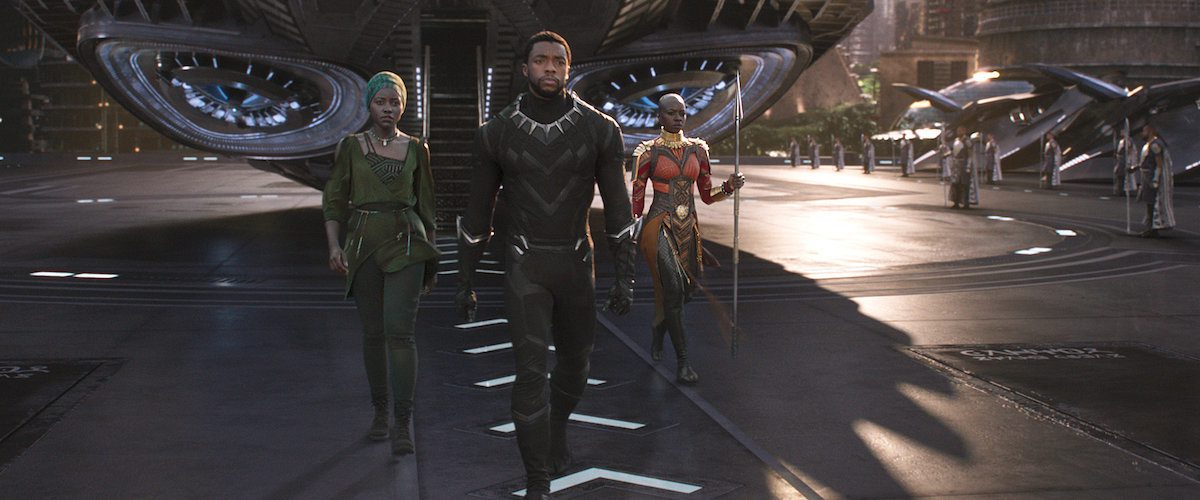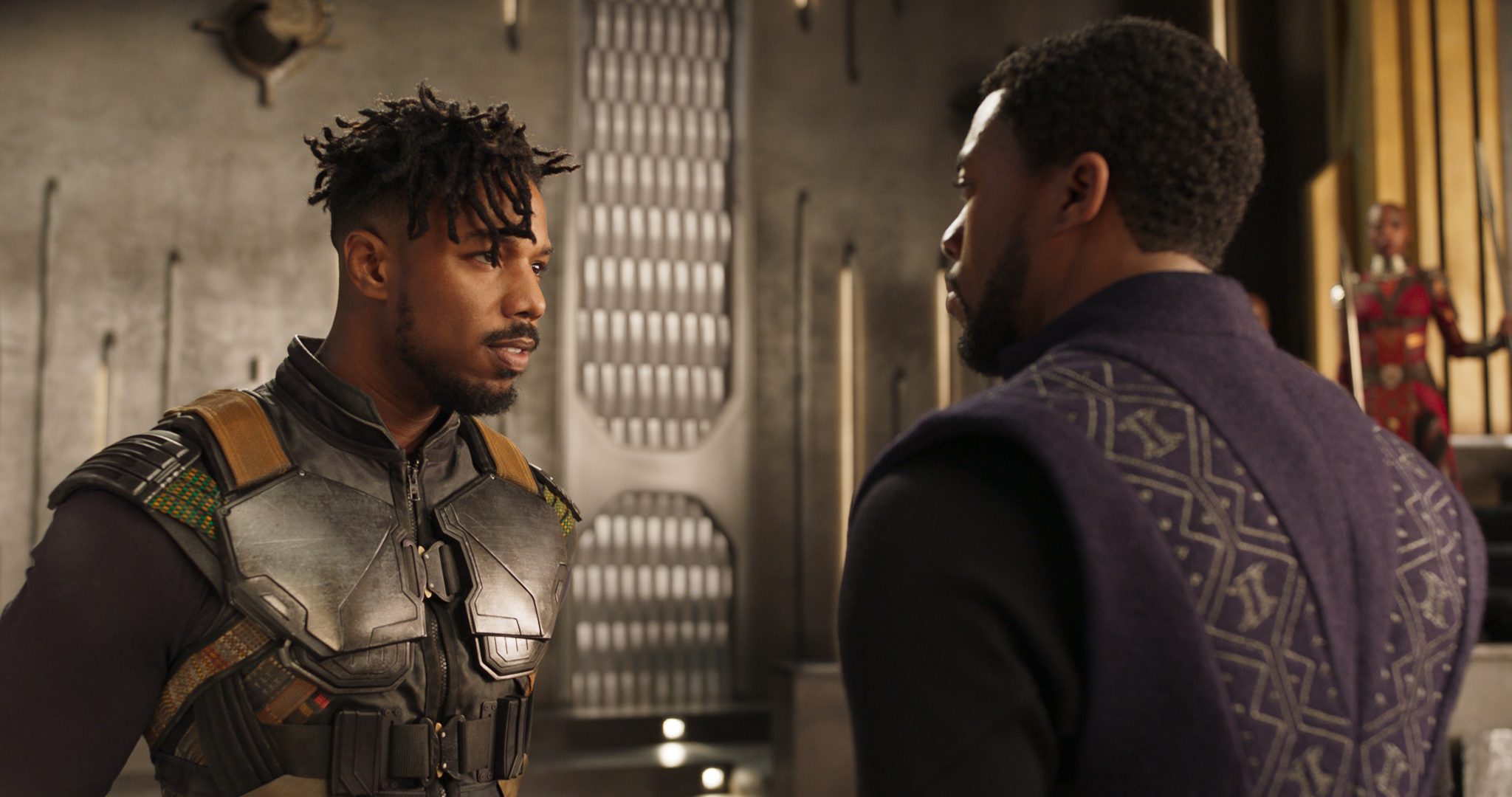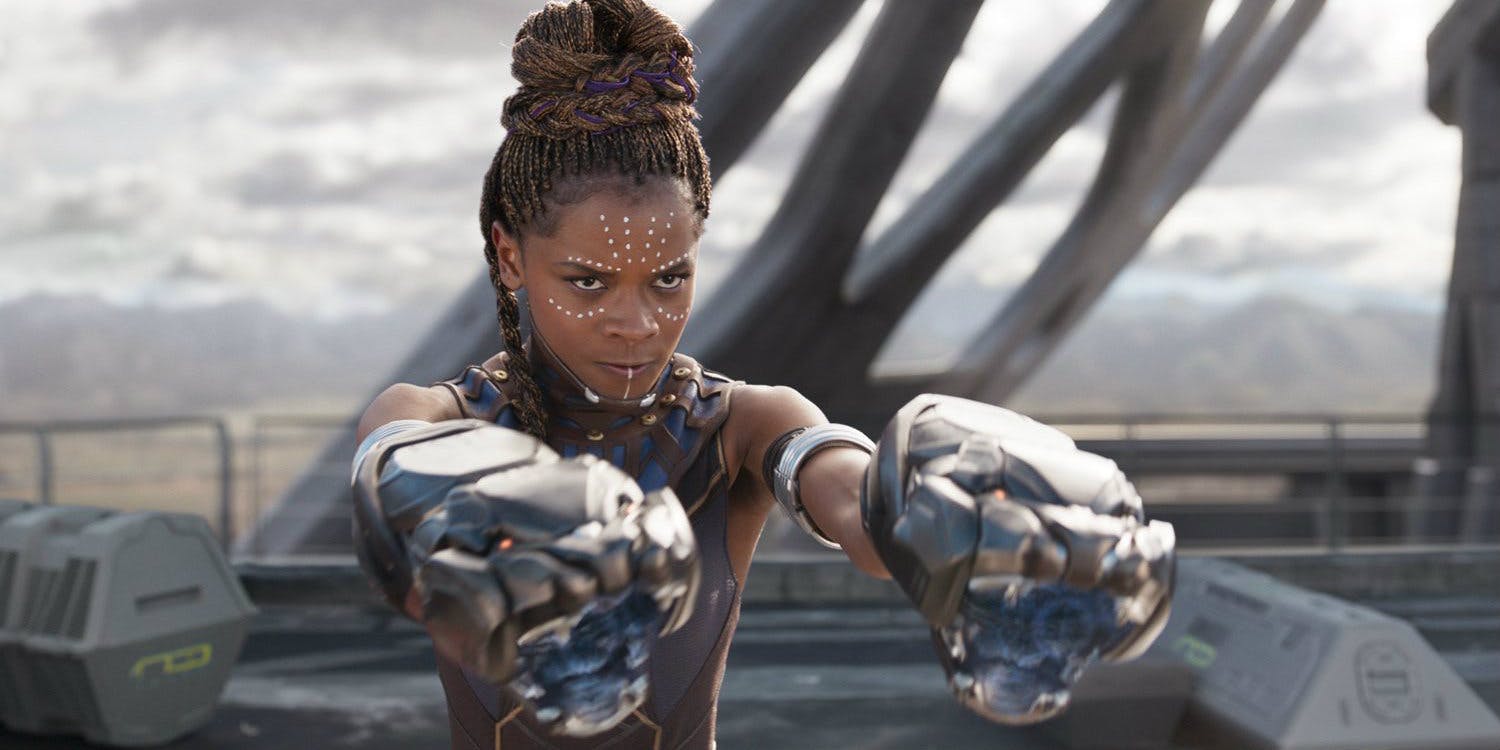In the massive, film-ending battle at the climax of Ryan Coogler’s Black Panther, Oscar nominee Daniel Kaluuya rides an armor-plated rhinoceros into a melee, but he does so with gravity, purpose, and no degree of self-consciousness. In many ways, the image is emblematic of the balance that Coogler is able to achieve in his film, which is one of Marvel’s best. Black Panther effortlessly balances entertainment with insight, and is never less than thrilling or compulsively watchable. The social importance of the film has already made headlines, and it’s something that Marvel is keenly aware of. But this isn’t a lecture. It’s inspiring, to be sure, but it’s also hugely entertaining.
When we catch up with T’Challa, King of Wakanda (played by Chadwick Boseman and last first seen in Captain America: Civil War), he’s on a rescue mission to liberate Nakia (Lupita Nyong’o), a Wakandan spy and T’Challa’s former paramour. It soon becomes evident that Nakia doesn’t need his help, and scolds him for his intervention. (There’s also a great comedic beat when T’Challa, in full costume, can only look at her and muster up “Hi.”) They’re joined by Okoye (Danai Gurira), T’Challa’s head of security, and Coogler establishes his film’s gender politics early on. The camera doesn’t linger on T’Challa during these fight scenes, as one would imagine, given that he’s the title character. Rather, he fights in tandem and cooperation with Nakia and Okoye; their styles compliment each other, and they’re stronger as a unit than as individuals, which speaks to the film’s overarching themes of togetherness and unity.
The politics of Wakanda are boldly portrayed. Coogler (and his co-writer, Joe Robert Cole) is uninterested in good-vs-evil binaries. Wakanda is isolationist to the point that they’ve hidden themselves off from the world with cloaking technology, afraid of what the world would do if it had access to the country’s rich supply of vibranium (the world’s strongest metal, the same substance that Captain America’s shield is made of). It’s a dicey thing to consider, and Coogler (sadly, not Koogler) wants to ask: how far does responsibility go? Wakanda’s technology could revolutionize the world, but the endpoint would inevitably be global war.
This is the same question asked by Erik Killmonger (Michael B. Jordan), who is Black Panther‘s villain in name only. Killmonger is one of the more complicated, sympathetic villains in the entire Marvel canon (I’m going to continue using “villain” as shorthand). He wants to take the throne from T’Challa and distribute Wakandan tech to impoverished, oppressed neighborhoods and areas all over the world. He’s tired of being on the bottom, watching society advance and leaving people like him in its wake. Killmonger is one of Marvel’s most timely villains, and one of its most complex. Sure, he wants to rule Wakanda, and if that means killing T’Challa, so be it. But he doesn’t have his own interests in mind; he wants to help people from turning into more Killmongers. The whole time, he’s thinking of his childhood in Oakland.
Michael B. Jordan is magnificent in the role. Like Oscar Isaac, Jordan has movie-star good looks and limitless charisma, but refuses to coast on it. In every one of his performances, Jordan pushes himself, and here he challenges our preconceptions of what a villain looks like, or how they behave. There’s an undercurrent of sadness to his performance that shows you just how lonely a crusade can be. There are a few times in the film where you’ll find yourself sympathizing with him, and a few times where even T’Challa sees eye to eye with him. (Andy Serkis, as Ulysses Klaue, brings no such nuance to his role, but the role doesn’t require it. Klaue is someone who just loves being a bad guy, and Serkis is an absolute delight.)
The cast is superb, and there’s not a sour note in any performance. Boseman is predictably great, delivering a low-key potrayal that’s at the opposite end of the spectrum from Jordan’s. Boseman only raises his voice once or twice; more than that, he’s a deft ensemble player, willingly ceding scenes to his co-stars. In one of his last scenes with Killmonger, T’Challa is nearly silent, and Boseman knows enough to step back and let Jordan land the scene.
The women in the film are incredible. Nyong’o is more than Boseman’s equal, and Gurira, as the head of T’Challa’s all-female coterie of guards, is magnetic and imposing. The star-making performance, though, is that of Letitia Wright, playing T’Challa’s sister, Shuri. Shuri serves the same function as Q from the James Bond films, but Black Panther still finds a way to make her an integral part of the action. Wright captivates whenever she’s on screen, and is never anything less than funny, charming, and effortlessly cool.
The film suffers from a bit of bloat, which is becoming an increasingly frequent Marvel problem. At 135 minutes, Black Panther is one of the studio’s longest offerings, and it might spend a few too many scenes in the ancestral plane (twice in twenty minutes, for instance). The Marvel-mandated fracas at the end is occasionally muddled (blame it on special effects pre-viz), but the hand-to-hand combat scenes make up for it. There are two great fights in front of a waterfall that are simply showstoppers. Coogler relishes in these moments, and shows that the fluid, full-contact fighting in Creed was no fluke.
The film looks incredible, too. Rachel Harrison (who just became the first woman ever Oscar nominated for cinematography, having shot Mudbound) and production designer Hannah Beachler (Moonlight) make Wakanda look a sunny version of Blade Runner‘s Los Angeles. The costumes by Ruth Carter (Selma) are equally futuristic and traditional, giving Black Panther a unique, instantly recognizable aesthetic.
It’s been incredibly satisfying to watch Marvel expand itself and toy with its universe, in films like Guardians of the Galaxy and Thor: Ragnarok. This is a brilliant addition to an already well-established world. Marvel needs more films like Black Panther.
4.5/5



